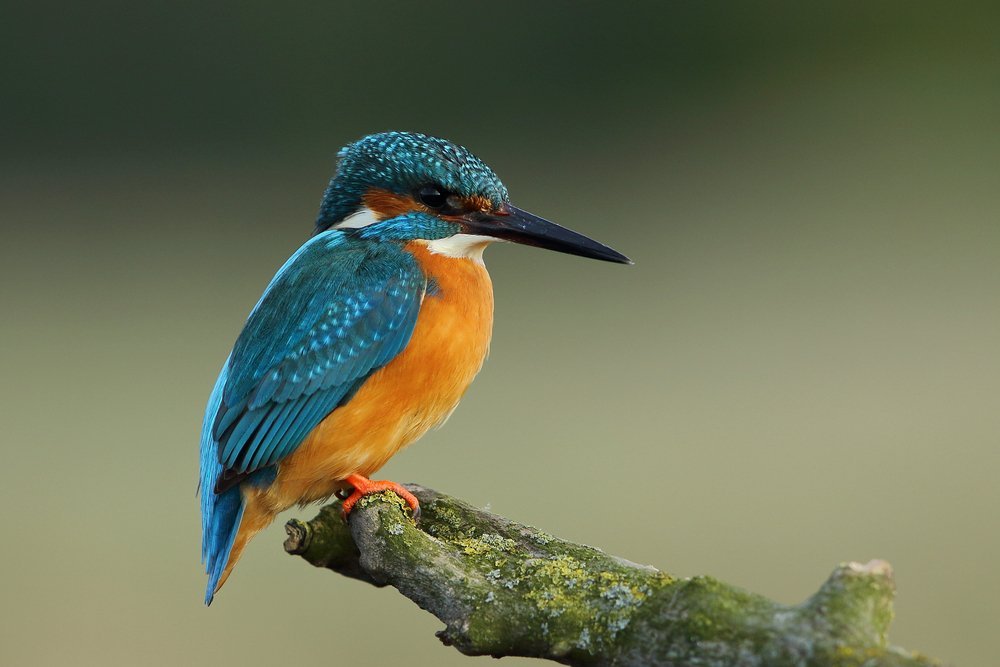As keen birder Calvin Holbrook explains, the mindful nature of bird watching makes it both a happy – and healing – hobby. From reducing stress levels to providing moments of breathtaking awe, discover seven key mental health benefits of bird watching.
My interest in bird watching came totally out of the blue. Well, a shade of blue that is: turquoise, in fact. A stunning colour on the gleaming coat of a male kingfisher swooping in front of me on a river walk. My experience with this long-beaked beauty lasted just a couple of seconds – a flash and it was gone – but it will stay with me a lifetime. Furthermore, it sparked a curiosity in me to start ‘birding’ and experience the many mental health benefits bird watching has to offer.
Indeed, the timing of the kingfisher showing up couldn't have been better in terms of my own mental health. I'd recently moved back home to care for my seriously ill mother when COVID hit: a double-whammy of new responsibilities, emotional upheaval, pain and challenges.
On the upside, I was lucky enough to be based on an island. It provided me with a stunning coastline and a multitude of woods, forests and marshes to explore. My prescribed daily walk in nature kept my sanity under check, and it wasn't until my encounter with the kingfisher that I really began to be aware of all the different types of birds around me.

The majestic kingfisher shutterstock/Sacharewicz Patryk
In my local park I started noticing the colours of the jay and the excessively loud squarks it would make. On heathland strolls I was lucky enough to spot hard-to-find yellowhammers and the equally rare Dartford Warbler. And during marsh visits I was blessed to witness many of the giant white-tailed eagles that had been released here on the Isle of Wight. Robins, woodpeckers, sparrows; I had my eye on them all.
But what I really noticed while watching my feathered friends was the benefits bird watching made to my mental health. While out birding, a sense of calm, grace and awe would regularly wash over me.
7 health benefits of bird watching
And it turns out I'm not alone in noticing the multiple mental (and physical) health benefits that bird watching provides. Multiple studies have shown the advantages of bird watching, and with a 2004 survey showing that almost 3 million adults in the UK regularly go birding, that's a lot of people that could be seeing improvements in their mental health. So, here are seven specific ways that bird watching has benefited my mental health – perhaps it will do the same for you, too?
1. It encourages mindfulness
Bird watching is essentially an act of mindfulness, and we all know some of the proven health benefits that can bring – reduced rumination and lowered blood pressure to name but two.
In fact, practising mindfulness specifically through birdwatching has been scientifically shown to improve mental health. In a 2017 study published in BioScience, scientists from England’s University of Exeter proved that when people witnessed more birds in their daily lives, they experienced reduced prevalence and severity of depression, stress, and anxiety.
Furthermore, participants didn’t even need to interact with the birds directly: simply watching them was enough to signify an improvement in mental health.
Additionally, research from the University of Surrey has suggested that actively listening to birdsong contributes to perceived stress recovery and attention restoration.
I've experienced these reported benefits of bird watching first-hand. While I was caring for my mother – and during the grief that has followed since her death – walking in my local parks and the mindful manner of bird watching has provided me with the opportunity to 'press pause' on painful feelings and celebrate the beauty of nature and simplicity. Bird watching requires us to shift our attention and awareness, living fully in the present moment (the essence of mindfulness).

Bird watching offers many mental health benefits
It doesn’t matter if you don’t have a garden; you can feel the benefits of bird watching by practising it from a balcony, window, or by going to your local park or woodland. Stay fully mindful and be sure to focus your attention on how the birds look and sound. Examine the details in their plumage and explore the colours. Do you see any patterns? How long is its beak? What do the claws look like? Can you spot the differences between the male and female of the species?
Also, be sure to focus on their calls. Is the sound high- or low-pitched? Are there any patterns in the noises they make? Can you hear a species ‘talking’ to each other? Can you try and imitate their calls? Also, what behaviour do they display? By immersing yourself in the world of the bird your mind should shift away from your worries or other thoughts.
2. It keeps you physically active
You may think the exercise attached to spotting birds involves little more than standing still and flexing your arms as you lift a pair of binoculars, but you'd be wrong! As bird watching is mainly an outdoor activity it often involves walking or hiking around different terrains – woodland, shrub, marsh, clifftop. Indeed, many of the more interesting or hard-to-find species may be lurking in more remote areas away from human activity, meaning more effort is required to reach them.
And, as you may already know, the benefits of exercise are both physical and mental. Exercise – even walking for a time – leads to an increase in endorphins, one of our so-called happiness hormones, which helps to boost mood and reduce stress.
3. Nature is healing
To experience the full health benefits of bird watching you need to get out of your home and in to nature. According to studies, natural environments are proven to have two huge benefits when it comes to our emotions.
Firstly, being regularly connected to nature leads to a reduction in stress and mood improvement. Scientists have found a correlation between exposure to natural stimuli (such as birds), reduced stress and anger, and improvement in reported well-being and mental health.
“Taking the time to focus on our feathered friends during bird watching requires us to shift our attention and awareness, living fully in the present moment (the essence of mindfulness).”
The second emotional benefit of being in nature may not be so obvious. It involves developing stronger bonds with others. That's because an improved and more relaxed frame of mind translates to a deeper attitude of compassion, that, in turn, can improve the quality of our social bonds.
Furthermore, spending time out in nature brings forth emotions like joy, awe, serenity, inspiration and gratitude. Consider topping up the mental health benefits of bird watching by combining it with a forest bathing session for a deeply relaxing and rejuvenating experience. Take a break from your screens, switch off your phones, and go birding outside.

Your author with his trusted binoculars
4. It keeps you social
I prefer to go bird watching by myself – I find the calm and peace of being alone with nature healing and restorative – but that doesn’t mean I am without company. Indeed, the hobby of birding generates a thriving community of like-minded individuals that like to chat, share stories and tips, and, well, just have a laugh.
In fact, if you head to a renowned birding spot over and again, you're bound to bump into fellow birders who will soon become familiar faces, and perhaps even friends. Indeed, another advantage of bird watching is that it can be a great way to make new buddies and the mental health benefits of staying social are well proven: not only does it reduce loneliness and boost well-being, but it can sharpen memory and cognitive skills, too.
5. It provide moments of awe
Last year, after a day on the beach in a remote woodside beach in Tarragona, Spain, a bird I have been desperate to spot – the exotic-looking Eurasian hoopoe – flew down from nowhere and paraded its plumage and elongated beak right in front of me. This left me awestruck for the rest of the day.
Such moments of awe and wonder make up another of the mental health benefits of bird watching. That's because studies have shown that awe can decrease stress levels, increase generosity and kindness, and make us feel happier overall.
RELATED: 8 reasons why awe makes you life better
Psychologist Jonah Paquette explains the value of awe in his book Awestruck. In it, he writes: “Awe blurs the line between the self and the world around us, diminishes the ego, and links us to the greater forces that surround us in the world and the larger universe.”
Bird watching provides many opportunities to experience wonder, surprise and amazement. Whether it’s spotting a new bird species, hearing an unusual call, or watching a display or mating ritual, bird watching definitely provides many awe-some moments.

Bird watching can be awe-inspiring shutterstock/Reni Rudisin
6. It stimulates and challenges
Yes, bird watching is relaxing but it definitely won't leave you horizontal. In fact, birding keeps you alert and can be challenging, another mental health benefit.
Indeed, trying to spot a bird after hearing its call is part of the fun, but it's rarely easy. Challenge yourself to spot a sneaky woodpecker in the branches after hearing its familiar tap-tap-tap sound and you'll likely be scouring the tree for ages before you uncover it.
“Awe and wonder make up another of the mental health benefits of bird watching. Studies have shown that awe can decrease stress levels, increase generosity and kindness, and make us happier.”
While my mum was seriously ill I challenged myself to train a pair of nesting robins to feed from my hand. Every day I'd go sit on the same bench and the same robin would be back to take seeds from me; first from the bench itself and then later from my legs. Within a fortnight it was brave enough to take the food directly from my hand. Watching this little red-breasted bird then pass the food to its partner (and perhaps keeping a chick alive) was particularly life-affirming when the life of the person I loved most was fading.
Trying to spot and identify new species is also a stimulating challenge. Birds will often tease us, flitting in and out of trees to get our attention then zipping off again the moment you've managed to get your binoculars on them. So, it takes time and effort to track them down sometimes.
According to CareUK, the process of looking for birds and identifying the species can even be calming for people living with dementia. Furthermore, repetition – in the form of visiting the same places and seeing the same birds – can also be reassuring to someone living with cognitive impairment.
7. It'll make you laugh
My final health benefit of bird watching relates to the humour it often provides. Remember that old saying that 'laughter is the best medicine'? Well, the studies back it up: in the short-term laughter reduces stress and soothes tensions. In the long-term it can relieve pain, boost overall mood and even improve your immune system.
And when you stop to pay attention you will see that birds have fascinating lives that are as funny to observe as they are beautiful. If you pay close attention to their habits and behaviours you will see some hilarious antics when they are feeding, mating or fighting. It can be like watching a soap opera – but in a feathery format!
Some birding tips
-
Purchase a small pair of basic binoculars online or from a second-hand shop. An essential item for a budding birder, binoculars will help you get a closer look at birds that are in the distance so you can examine them in more detail.
-
Take a pocket book of birds with you when you go out in nature so you can try and identify them and tick off any new finds. Great for adults and kids.
-
Tread carefully and don’t make too much noise as not to scare them off.
-
Visit the same places daily and you may be able to build a bond with the birds.
- Put up bird feeders in your garden or leave seeds on your balcony. Once you start attracting birds to your outside space through food, they will remember it and come back regularly, increasing the amount of mindful bird watching time you can get.
The takeaway: bird watching and mental health
From reducing stress to providing real moments of awe, the mental health benefits of bird watching are many. It's something you can do by yourself or as a family activity, and the birding community is welcoming and friendly. The mindful practice of birding is also fun, free and gets you out in nature. So, what's not to love? And if, like me, you only ever get to see a kingfisher once, I promise you it will be worth it for that alone! •
Main image: shutterstock/soft_light
happiness.com | The fine art of being: learn, practise, share
Are you a happiness.com member?
Join free now and:
■ enjoy our happiness magazine
■ share and support in our happiness forum
■ Develop with free online Academy classes
Written by Calvin Holbrook
 Calvin edits the happiness magazine, and loves swimming, yoga, dancing to house/techno, and all things vintage! Find out more.
Calvin edits the happiness magazine, and loves swimming, yoga, dancing to house/techno, and all things vintage! Find out more.







Join the conversation
You are posting as a guest. If you have an account, sign in now to post with your account.
There are no comments to display.